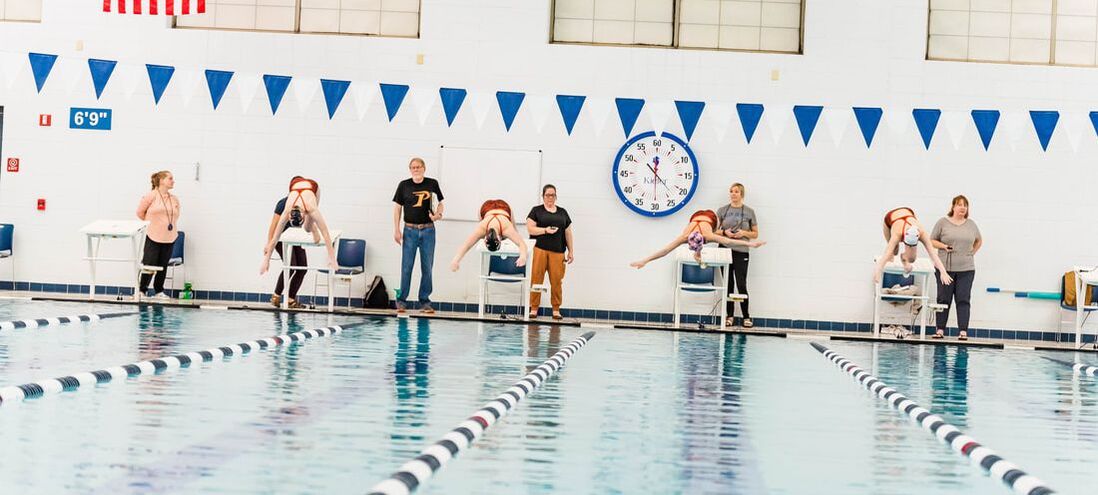
Welcome Parents and Swimmers!
Parent Responsibilities
Parents contribute to the success experienced by the child and the team. Please ensure you practice good sportsmanship at all times toward coaches, officials, opponents and teammates. Parents serve as role models and their children emulate their attitudes.
Parents contribute to the success experienced by the child and the team. Please ensure you practice good sportsmanship at all times toward coaches, officials, opponents and teammates. Parents serve as role models and their children emulate their attitudes.
|
Practice Guidelines
Swimmers should be "pratice ready" when practice begins. This means: 1. Having swim cap and goggles on 2. Water bottle (Please no juice, sugary drinks, etc. in the pool) 3. Listening ears ready; coaches will be directly swimmers to their assigned lines at practice start 4. Parents are welcome to stay for practice or return to pick up their swimmer(s) when practice is over. |
Swim Meet Guidelines
Warm-ups usually start 30-45 minutes before the official start time of the meet. Be in your swimsuit and ready to get in the water at the designated warm-up time. Bring the following items: 1. Sharpie marker to write events on your swimmer’s arm or leg. 2. Snacks- meets may last several hours. Fruit and crackers are great choices that are digested quickly plus high in sugar. 3. Drinks - to ensure you stay hydrated 4. 2 or more towels. Yoga mats are great too! 5. Sweatpants and sweatshirts to stay warm between events 6. Appropriate footwear - flip flops / sandals 7. Extra goggles and spare swim cap. 8. Cash to purchase items from food stand or duck throwing contest. 9. Good attitude! During meet, swimmers need to stay in designated area near the coaches or with parents. Prior to their event, each swimmer is to go to the staging area to sit in their assigned heat and lane. Swimmers are encouraged to cheer on their teammates on during the meet. |
Practice VideosCheck out these YouTube videos selected by our head coach to help you work on your swim skills!
|
10 Commandments for Swimming Parents by Rose Snyder, Managing Director Coaching Division, United States Olympic Committee Former Director of Club Services, USA Swimming (adapted from Ed Clendaniel's 10 Commandments for Little League Parents) I. Thou shalt not impose thy ambitions on thy child. Remember that swimming is your child's activity. Improvements and progress occur at different rates for each individual. Don't judge your child's progress based on the performance of other athletes and don't push him based on what you think he or she should be doing. The nice thing about swimming is every person can strive to do their personal best and benefit from the process of competitive swimming. II. Thou shalt be supportive no matter what. There is only one question to ask your child after a practice or a competition - "Did you have fun?" If meets and practices are not fun, your child should not be forced to participate. III. Thou shalt not coach thy child. You are involved in one of the few youth sports programs that offers professional coaching. Do not undermine the professional coach by trying to coach your child on the side. Your job is to provide love and support. The coach is responsible for the technical part of the job. You should not offer advice on technique or race strategy. Never pay your child for a performance. This will only serve to confuse your child concerning the reasons to strive for excellence and weaken the swimmer/coach bond. IV. Thou shalt only have positive things to say at a swimming meet. You should be encouraging and never criticize your child or the coach. Both of them know when mistakes have been made. Remember “yelling at” is not the same as “cheering for”. Continued… V. Thou shalt acknowledge thy child's fears. New experiences can be stressful situations. It is totally appropriate for your child to be scared. Don't yell or belittle, just assure your child that the coach would not have suggested the event or meet if your child was not ready. Remember your job is to love and support your child through all of the swimming experience. VI. Thou shalt not criticize the officials. Please don't criticize those who are doing the best they can in purely voluntary positions. VII. Honor thy child's coach. The bond between coach and swimmer is special. It contributes to your child's success as well as fun. Do not criticize the coach in the presence of your child. VIII. Thou shalt be loyal and supportive of thy team It is not wise for parents to take swimmers and to jump from team to team. The water isn't necessarily bluer in another team's pool. Every team has its own internal problems, even teams that build champions. Children who switch from team to team find that it can be a difficult emotional experience. Often swimmers who do switch teams don't do better than they did before they sought the bluer water. IX. Thy child shalt have goals besides winning. Most successful swimmers have learned to focus on the process and not the outcome. Giving an honest effort regardless of what the outcome is, is much more important than winning. One Olympian said, "My goal was to set a world record. Well, I did that, but someone else did it too, just a little faster than I did. I achieved my goal and I lost. Does this make me a failure? No, in fact I am very proud of that swim." What a tremendous outlook to carry on through life. X. Thou shalt not expect thy child to become an Olympian. There are 250,000 athletes in USA Swimming. There are only 52 spots available for the Olympic Team every four years. Your child's odds of becoming an Olympian are about .0002%. Supportive Tips
|
